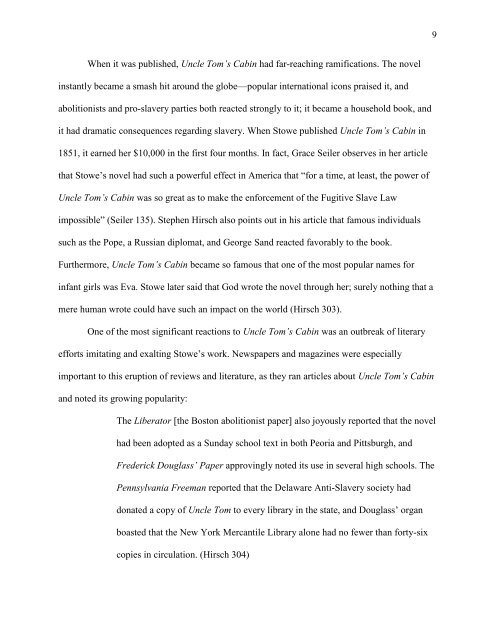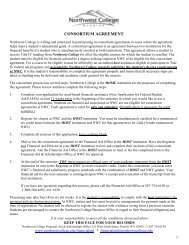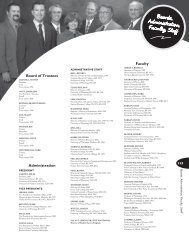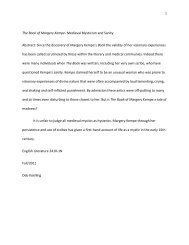Uncle Tom's Cabin
Uncle Tom's Cabin
Uncle Tom's Cabin
You also want an ePaper? Increase the reach of your titles
YUMPU automatically turns print PDFs into web optimized ePapers that Google loves.
9<br />
When it was published, <strong>Uncle</strong> Tom’s <strong>Cabin</strong> had far-reaching ramifications. The novel<br />
instantly became a smash hit around the globe—popular international icons praised it, and<br />
abolitionists and pro-slavery parties both reacted strongly to it; it became a household book, and<br />
it had dramatic consequences regarding slavery. When Stowe published <strong>Uncle</strong> Tom’s <strong>Cabin</strong> in<br />
1851, it earned her $10,000 in the first four months. In fact, Grace Seiler observes in her article<br />
that Stowe’s novel had such a powerful effect in America that “for a time, at least, the power of<br />
<strong>Uncle</strong> Tom’s <strong>Cabin</strong> was so great as to make the enforcement of the Fugitive Slave Law<br />
impossible” (Seiler 135). Stephen Hirsch also points out in his article that famous individuals<br />
such as the Pope, a Russian diplomat, and George Sand reacted favorably to the book.<br />
Furthermore, <strong>Uncle</strong> Tom’s <strong>Cabin</strong> became so famous that one of the most popular names for<br />
infant girls was Eva. Stowe later said that God wrote the novel through her; surely nothing that a<br />
mere human wrote could have such an impact on the world (Hirsch 303).<br />
One of the most significant reactions to <strong>Uncle</strong> Tom’s <strong>Cabin</strong> was an outbreak of literary<br />
efforts imitating and exalting Stowe’s work. Newspapers and magazines were especially<br />
important to this eruption of reviews and literature, as they ran articles about <strong>Uncle</strong> Tom’s <strong>Cabin</strong><br />
and noted its growing popularity:<br />
The Liberator [the Boston abolitionist paper] also joyously reported that the novel<br />
had been adopted as a Sunday school text in both Peoria and Pittsburgh, and<br />
Frederick Douglass’ Paper approvingly noted its use in several high schools. The<br />
Pennsylvania Freeman reported that the Delaware Anti-Slavery society had<br />
donated a copy of <strong>Uncle</strong> Tom to every library in the state, and Douglass’ organ<br />
boasted that the New York Mercantile Library alone had no fewer than forty-six<br />
copies in circulation. (Hirsch 304)











